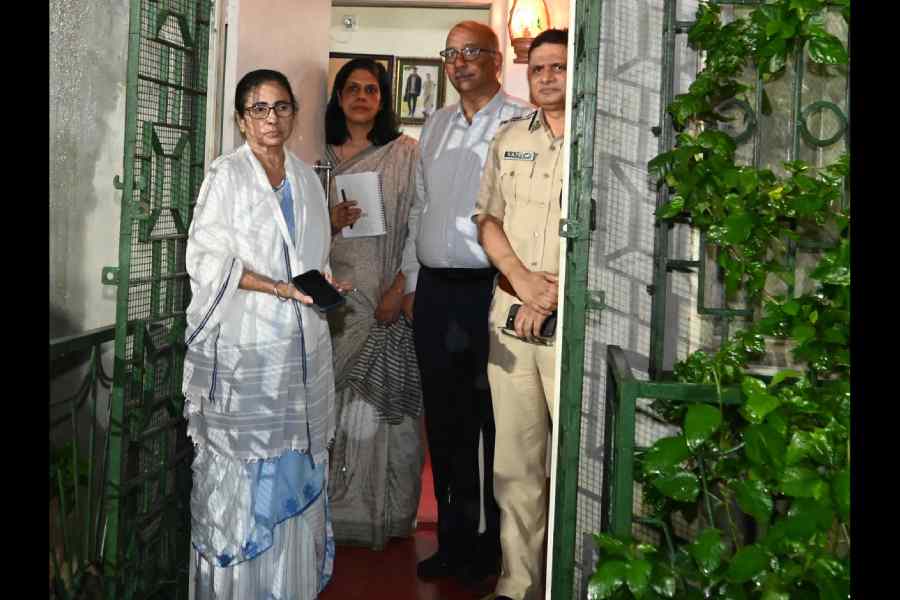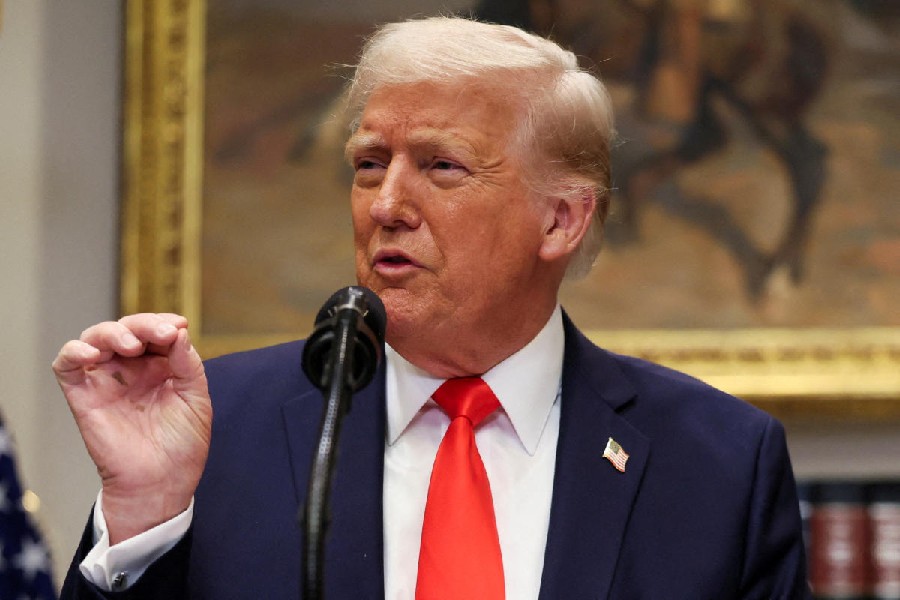The protests must end and the junior doctors of government hospitals in Bengal should return to work. (No, the protests should go on, there are enough senior doctors to fill in.) The people should get back to a festive mood in Durga Puja season. (No, this is not the time for festivities.)
Over the past week or so, appeals from various quarters have been made to the junior doctors, on cease-work since the brutality inflicted on their colleague on August 9 at RG Kar Medical College and Hospital in Calcutta, and the people at large. The top judge of the highest court of the land even set a deadline — 5pm on Tuesday, September 10 — for them to return to work to avoid any penal action.
In an audacious — some will say insolent, depending on which side of the divide they are — act of defiance, the doctors refused, daring the government to act against them as they began a sit-in in front of Swasthya Bhavan, the headquarters of the state’s health department, which, the doctors say, must be “swept clean” if a total reformation has to be made. They presented a fresh list of demands — the list has been changing with regularity — that now called for the resignation of the top health bureaucrat of the state and continued to press for the removal of the city’s police commissioner.
How has the government responded? Shortly after the deadline of 5pm on Tuesday, the government sent a letter signed, ironically, by the very bureaucrat in the health department the agitators want to be sacked, inviting the doctors to a meeting at Nabanna, the state secretariat. And, in a glaring disregard for sensibilities, it addressed doctors as “Dear Sir”, as if women don’t belong to the medical force.
The doctors responded the following morning and an exchange of missives ensued. In the evening, the people were told that the chief minister, Mamata Banerjee, had herself waited for the doctors to arrive but they didn’t. The doctors argued they weren’t told whom they would meet with. The following day, September 12, the doctors received another letter, this time from the chief secretary, informing them that the chief minister would await them. A delegation of 34 doctors went to Nabanna but didn’t cross the threshold as they insisted on live-streaming of the deliberations; the government said nothing doing. Mamata waited for over two hours, and then addressed the press to explain, with folded hands, why she had failed to get the doctors to talk.
On Saturday, Mamata, who had thus far not visited the RG Kar protest site, arrived at the Swasthya Bhavan agitation and again held out an olive branch. Emails were exchanged and a delegation of 30 and odd protesters went to the chief minister’s Kalighat residence on her invitation. The protesters insisted on live-streaming, the government refused; the protesters insisted on videography by their videographer, the government refused; the chief minister said proceedings would be videographed by the government and the minutes recorded and signed by both sides, the doctors refused. After three hours of appeals and pleadings, Mamata went back and shut the door, at least for the evening, on the talks.
The doctors, realising that a window was being closed, pleaded with the others — the junior health minister, the chief secretary — but by then the government, in their wisdom, had decided that enough was enough. At least for the night. Was it too difficult to sit across the table even at a late hour when the junior doctors had finally agreed to scale down their demands on recording the discussions?
Meanwhile, the protest site is getting more and more boots on the ground. Food, water, fruits, crates of water and beverages, paper napkins and toilet rolls are in abundant supply. Biodegradable toilets have been installed thanks to an anonymous benefactor. Strangers not part of the medical fraternity are chipping in with supplies. Housing complexes in Calcutta, block associations in Salt Lake, groups in the city’s heritage clubs which have a fair share of doctors as members are all ferrying whatever is necessary for the protesters to keep up their agitation.
The message from all this is that the protests have garnered a fair bit of sympathy from a substantial part of Calcutta’s middle-class Bengali intelligentsia, be they doctors, lawyers, corporate professionals, teachers, journalists and the like. They are even willing to forego celebrations during Durga Puja, inarguably the biggest carnival for Bengalis, with calls going out to shun the dole granted by the government, curtail the festivities and even stop the usual gastronomic feasts laid out in barowari pujas.
For the government, it’s a tricky terrain. No doubt it is facing an enormous trust deficit. There is apparently a section within the ruling Trinamool Congress that believes that the majority of those Calcuttans who have spontaneously taken to the streets are in any case not voters of the party, so the protests can be ignored. Nothing could be more fallacious. The outpouring of outrage and fury has been across the city and cuts across political ideologies and sympathies. Mamata, who has an instinct for the pulse of the people, would surely have understood that. But has she done enough for the people to reinstate that trust in her?
The doctors’ allegations of poor working conditions in government hospitals are a stark reality. Corruption is rampant and has eaten away the system like termites. The nexus between mafia-like syndicates run by political power pimps and unscrupulous doctors is deep-rooted. Just disbanding the patient welfare associations or Rogi Kalyan Samitis isn’t going to be enough. The entire system needs an overhaul and Mamata needs to be bold enough to accept that.
Her political opponents sense this is the opportune moment to strike. The BJP, which has been left out of the main protests in Calcutta and is also not willing to be seen as a party supporting a cease-work that has defied the Chief Justice of India, is looking to up the ante after the Supreme Court hearing this week and also take the movement to the districts.
The Left — the CPM in the main — believes it has a chance to recover some of the huge ground it has lost among the Bengali middle classes as it claims to be the “inspiration” for the agitators. Doctors with CPM leanings who have been marginalised within the system since 2011 have suddenly become prime-time regulars, sparing no opportunity to target the government, disregarding the fact that the erosion in Bengal’s health system began much earlier.
But the prime burden lies with the chief minister. She needs to acknowledge that a significant section of the masses that have hitherto supported her in elections are fed up with the deep-rooted malaise that has spread through the system. The arrest by the CBI of the officer-in-charge of the Tala police station in connection with the rape and murder he was tasked to investigate is unprecedented. The chief minister is also the head of the police department. People will rightfully demand an explanation from her. It would be inexact to counter them with political labels, as has been her wont.
One doesn’t quite know how, if at all, this impasse will end. But one thing is clear: the trust deficit in Mamata and her government, at least among a large section of the urban populace, is growing by the day. When the junior doctors insist on live-streaming proceedings, it is because they don’t entirely trust the government. And a vast section of the people believe the doctors are justified.
Mamata still has about 20 months in her current tenure. She still retains her support base among Muslims and large swathes of the hinterlands. A smart, if daring, move would be to call for early elections and find out if Bengal’s mandate remains with her. Trust is difficult to build and easy to lose. Mamata Banerjee must decide if she wants Bengal to trust their Didi.











